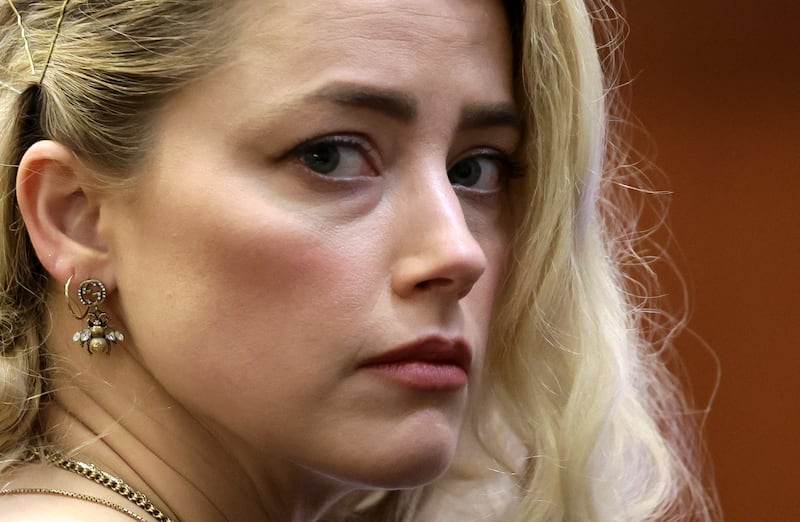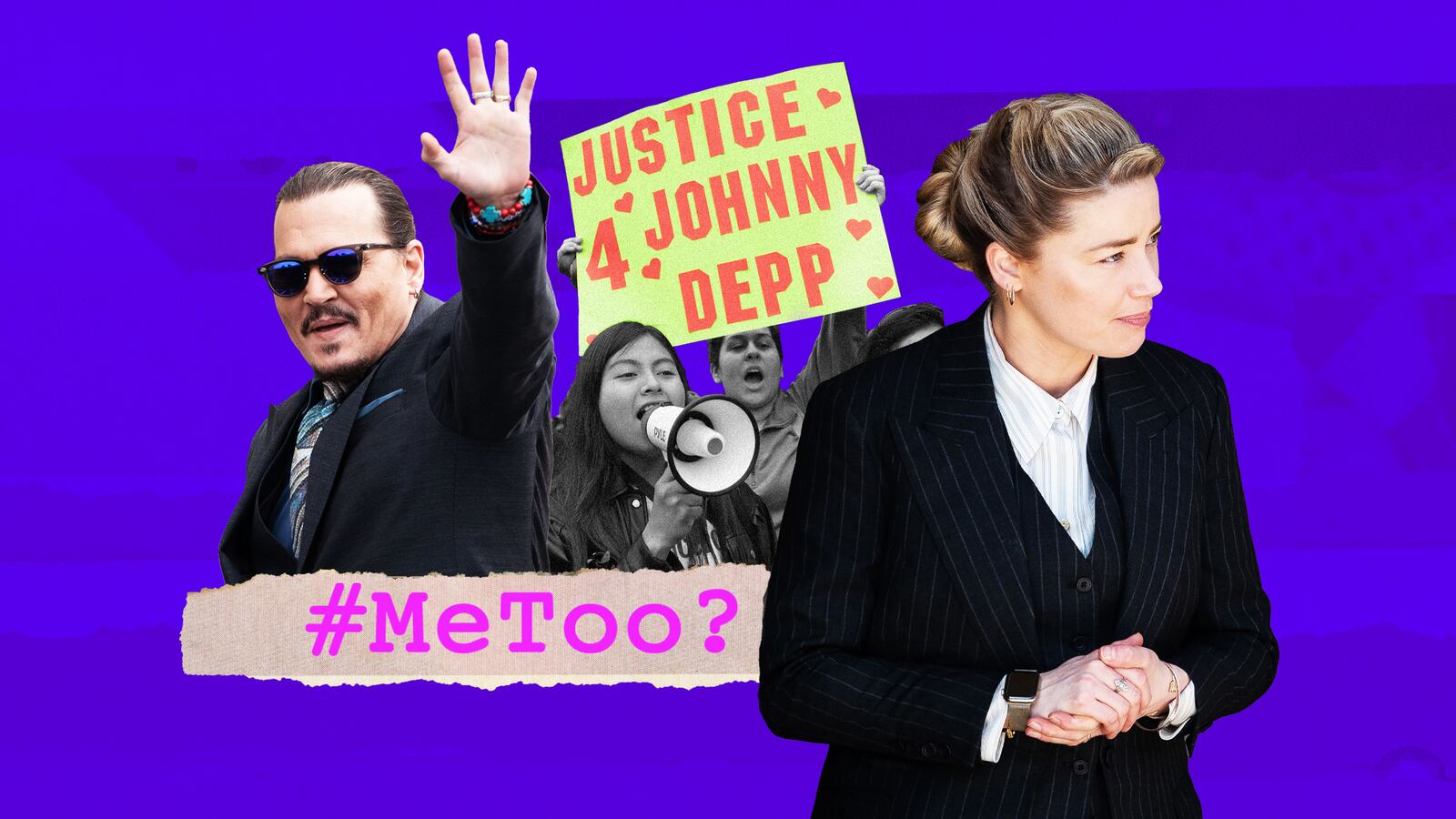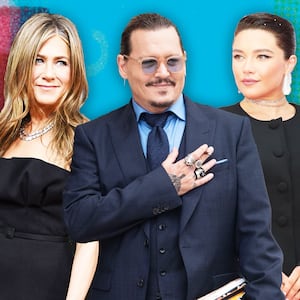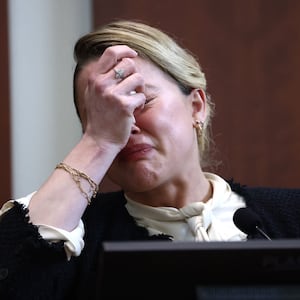After a highly publicized seven-week-long trial, a jury found Aquaman actress Amber Heard guilty of defamation against her ex-husband, actor Johnny Depp, on Wednesday for a Washington Post op-ed in which she discussed her experiences with domestic abuse. Depp was awarded $15 million in damages ($10.35 million given the state’s punitive damages cap), and Heard received $2 million.
Depp had previously lost a libel suit in the U.K. against The Sun after the tabloid branded him a “wife-beater,” with the judge finding that Depp had committed 12 of 14 alleged incidents of violence against Heard. While she didn’t name Depp in the Washington Post article, the Pirates of The Caribbean star and his defense team argued that Heard’s implicit allegations hindered his career. Simultaneously, the jury sided with Heard on one of her claims that Depp’s lawyer, Adam Waldman, defamed her when he called her abuse allegations a “hoax,” sending a rather perplexing, saddening message to victims of intimate partner violence and setting a troubling precedent for domestic abuse cases to come. (Waldman was also kicked off the trial team for leaking information to the press.)
Much of the online discourse during the trial (and, most likely, in the days following) has centered on Depp’s feverish army of online supporters and the nearly inescapable #JusticeForJohnnyDepp social media campaign that included propaganda funded by conservative media outlet The Daily Wire. Depp also had many vocal allies in Hollywood throughout the legal saga, including ex-partners Winona Ryder and Kate Moss, the latter testifying on his behalf during the trial, and pal Paul Bettany. The Daily Beast further discovered a handful of celebrities, such as Jennifer Aniston, Florence Pugh, Bella Hadid, Taika Waititi and Emma Roberts, had liked Depp’s post-trial celebratory statement and other pro-Depp sentiments on Instagram.
The amount of cruelty and ignorance displayed by Depp’s fans and supporters throughout the proceedings spoke volumes about the state of #MeToo and our culture’s limited understanding of domestic abuse. But the silence that surrounded Heard, specifically from her own industry, teaches an equally valuable lesson about the fickleness of celebrity-led social movements and class solidarity among the rich and famous.
Aside from Uncut Gems star Julia Fox, comedian Kathy Griffin and veteran actress (and Depp ex) Ellen Barkin, who testified on Heard’s behalf, you’d be hard-pressed to find any high-profile celebrity currently speaking out for her. Comedian Amy Schumer, an outspoken feminist, alluded to the results of the Depp/Heard hearing and the spectacle surrounding it, posting a Gloria Steinem quote on Instagram. Still, for whatever reason, Schumer was not comfortable calling out Johnny Depp or referring to the case explicitly in the manner she called out, say, Will Smith previously for his Oscars incident. Heard’s Aquaman co-star Jason Momoa liked her statement on Instagram but, strangely, double-tapped Depp’s as well.
The lack of support from Heard’s industry peers, in particular, is telling, given that it was only five years ago when Hollywood rallied around survivors of sexual assault and harassment following the bombshell accusations against producer Harvey Weinstein. A-list actors, filmmakers, and entertainers alike—largely women, but also some men—seemed comfortable and even eager to discuss the abuses they had endured working in Hollywood and encouraged other survivors across career fields to share their stories. Some even apologized for working with predatory men in the past, like Woody Allen, Roman Polanski, and Weinstein. Their most notable collective effort was the formation of Time’s Up, a non-profit organization that was originally founded as a legal fund for victims of workplace harassment but has taken on a much more confusing mission in the years following.
From the start, the celebrity involvement in Time’s Up was met with harsh criticism, given that, for the most part, the movie and television stars representing the non-profit weren’t activists and had no documented organizing experience. Celebrity board members included Schumer, Brie Larson, Reese Witherspoon, Jessica Chastain, Kerry Washington, Laura Dern, Alyssa Milano, America Ferrera, and Julianne Moore, among others. Over time, their efforts also seemed limited to increasing diversity and representation in Hollywood with little outreach to women across economic lines.
Since launching in 2018, Time’s Up has also come under fire for the amount of raised funds allocated to employee salaries and revelations that the group’s former CEO and co-founder, Tina Tchen, advised then-New York Governor Andrew Cuomo’s administration after he was accused of sexual harassment in 2020. That was also the same year that one of Time’s Up attorneys, Roberta Kaplan, who was originally representing Heard in Depp’s defamation lawsuit, withdrew from her case due to “travel and logistics” issues caused by COVID. Still, the organization has yet to comment on the viral smear campaign that Heard has endured and the implications it could have on victims, like other organizations have since the trial.

Amber Heard waits before the jury announced a split verdict in favor of both Johnny Depp and Amber Heard on their claim and counter-claim in the Depp v. Heard civil defamation trial at the Fairfax County Circuit Courthouse in Fairfax, Virginia, on June 1, 2022.
Evelyn Hockstein/AFP/GettyIn terms of the famous women (and some men) who aligned themselves with Time’s Up and its mission, it seems like their social-justice batteries have run out as well, even before Heard’s alleged abuse became public fodder. The last time we saw actors and directors like Ava DuVernay, Tracee Ellis Ross, Ellen Pompeo, Jennifer Aniston, Rashida Jones and Judd Apatow working publicly with the organization, they were circulating the hashtag #TimesUpGlobes in response to the revelation that the Hollywood Foreign Press Association had no Black members at the time. It was ultimately a conservative, insignificant initiative amid nationwide police brutality protests with little to no effect on the majority of the Black population. But it was a perfect encapsulation of the organization’s—and Hollywood’s—sorry contributions to pressing social issues.
Likewise, it’s not much of a surprise that the celebrity feminists who used Time’s Up and the #MeToo movement to develop a more socially-aware brand and get their “female-centered” projects greenlit have seemingly turned a blind eye to the injustices Heard has faced in front of the world, and will continue to suffer following Wednesday’s verdict. Much was said at the start of #MeToo about celebrities’ activism efforts only extending to their own. But it seems like they’re also incapable of supporting their peers at the risk of internet backlash. Heard’s social ranking as an actress who’s not particularly well-known outside of her contributions to the Aquaman franchise—and especially in comparison to her movie-star ex-husband—could also be a factor.
The media circus surrounding Heard would’ve been a great opportunity to reignite some of Hollywood’s more intelligent, politically active voices in their mission to combat violence against women and maybe even make up for some of the negative press Time’s Up has accrued over the past three years. But unlike when gender equality and sexual abuse became a hot topic during the Trump years, there’s nothing to be tangibly gained for supporting Heard. For now at least, Hollywood’s self-described feminists seem just as content as the rest of the world watching #MeToo fall by the wayside.







